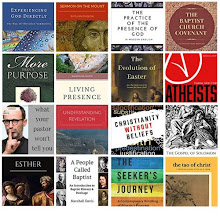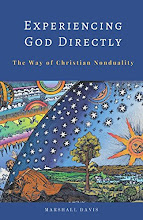I was confronted with hell in church Sunday. It wasn't the preacher who brought the subject to mind. He is not afraid to mention the H-word when the scripture text requires it, but this was not such an occasion. It was the Apostle's Creed that got me thinking about the infernal regions yesterday.
This congregation has the habit of repeating that ancient creed as part of worship, including the controversial words "He descended into hell." Christians do not universally accept this phrase. Some denominations consider it an optional article of faith; others omit these words altogether.
My liberal friends consider the concept of hell as an archaic remnant from a primitive past, which is now accepted only by fundamentalists and hatemongers. I know better. Hell was clearly taught by Jesus, and that's good enough for me.
But I have straddled the fence on the matter of Christ's descent into hell. I know the scriptures that purport to teach the doctrine, but I was not convinced that this was the correct interpretation of those texts. Now I am leaning more toward the hell-descending camp. I will tell you why.
As a pastor I have seen more hell than I ever imagined I would. As their shepherd I have had to descend into hell with my parishioners. Furthermore I have been through my own personal hell, and Christ accompanied me. So I know the Good Shepherd does this type of thing.
To deny Christ's descent into hell seems like just another attempt to deny the reality of suffering. It feels more like Christian Science than Christian orthodoxy. It is understandable that people want to avoid the hellish parts of life. So do I; I am no masochist. But many go further than personal avoidance of pain. Religion becomes an escape.
Religious conservatives escape hell by purchasing spiritual fire insurance. Just pray the "sinner's prayer," pick a "Get Out of Hell Free" card, and go directly to Home. The recent theological phenomena of the Pre-Tribulation Rapture and the Prosperity Gospel are just variations on this evangelical theme.
Liberals, on the other hand, discard the whole idea of hell as mythological hate speech. Either way it is an escape from hell. But Jesus was not one to take the easy road. He did not flee from even the most hellish suffering. For him the way to heaven wound through the gates of hell.
We tend to assume that the more spiritual we become the less pain we should have. Our heroes are stoic saints or calm buddhas rapt in holy bliss. We tend to assume that progress in the spiritual path provides increasing joy, peace and equanimity. What good is being holy if hell is part of the deal?
But the Kingdom of God includes the territory of Hades within its borders. In Jesus' parable of Lazarus and the rich man, Abraham could see the rich man in hell from this seat in heaven. As much as we do not like it, hell is part of the eternal landscape.
In his short novel, The Great Divorce, C. S. Lewis' pictured hell as contained in a tiny crack in the hinterlands of heaven. It is not outside the boundaries of God's presence, but not large enough to influence the crime rate of the New Jerusalem.
Any theology that negates the reality of evil and the suffering it causes - in this world or the next - is nothing more than a fantasy. All life includes hell, and that includes eternal life. The godly life accepts all experience - even the most painful - as part of the divine plan. The spiritual life involves descent into hell as well as ascent into heaven. That is the meaning of the cross, and why Christ still bears the stigmata even in paradise.
_________________
Image is "Faith Divine" by Martha S. Heimbaugh, 2004, painted, pieced fabric, 3-D puff. The artist writes of this piece: "The painting entitled Faith Divine is an abstract depiction of Christ's descent into Hell. The circles represent God's unending love and that this love transcends all evil or diversity. Through Christ's own Faith, he was able to make the descent and return to God the Father, victorious. The title Faith Divine, speaks to Christ's own faith and understanding of human emotions, to leave the familiar and fulfill His destiny."
This congregation has the habit of repeating that ancient creed as part of worship, including the controversial words "He descended into hell." Christians do not universally accept this phrase. Some denominations consider it an optional article of faith; others omit these words altogether.
My liberal friends consider the concept of hell as an archaic remnant from a primitive past, which is now accepted only by fundamentalists and hatemongers. I know better. Hell was clearly taught by Jesus, and that's good enough for me.
But I have straddled the fence on the matter of Christ's descent into hell. I know the scriptures that purport to teach the doctrine, but I was not convinced that this was the correct interpretation of those texts. Now I am leaning more toward the hell-descending camp. I will tell you why.
As a pastor I have seen more hell than I ever imagined I would. As their shepherd I have had to descend into hell with my parishioners. Furthermore I have been through my own personal hell, and Christ accompanied me. So I know the Good Shepherd does this type of thing.
To deny Christ's descent into hell seems like just another attempt to deny the reality of suffering. It feels more like Christian Science than Christian orthodoxy. It is understandable that people want to avoid the hellish parts of life. So do I; I am no masochist. But many go further than personal avoidance of pain. Religion becomes an escape.
Religious conservatives escape hell by purchasing spiritual fire insurance. Just pray the "sinner's prayer," pick a "Get Out of Hell Free" card, and go directly to Home. The recent theological phenomena of the Pre-Tribulation Rapture and the Prosperity Gospel are just variations on this evangelical theme.
Liberals, on the other hand, discard the whole idea of hell as mythological hate speech. Either way it is an escape from hell. But Jesus was not one to take the easy road. He did not flee from even the most hellish suffering. For him the way to heaven wound through the gates of hell.
We tend to assume that the more spiritual we become the less pain we should have. Our heroes are stoic saints or calm buddhas rapt in holy bliss. We tend to assume that progress in the spiritual path provides increasing joy, peace and equanimity. What good is being holy if hell is part of the deal?
But the Kingdom of God includes the territory of Hades within its borders. In Jesus' parable of Lazarus and the rich man, Abraham could see the rich man in hell from this seat in heaven. As much as we do not like it, hell is part of the eternal landscape.
In his short novel, The Great Divorce, C. S. Lewis' pictured hell as contained in a tiny crack in the hinterlands of heaven. It is not outside the boundaries of God's presence, but not large enough to influence the crime rate of the New Jerusalem.
Any theology that negates the reality of evil and the suffering it causes - in this world or the next - is nothing more than a fantasy. All life includes hell, and that includes eternal life. The godly life accepts all experience - even the most painful - as part of the divine plan. The spiritual life involves descent into hell as well as ascent into heaven. That is the meaning of the cross, and why Christ still bears the stigmata even in paradise.
_________________
Image is "Faith Divine" by Martha S. Heimbaugh, 2004, painted, pieced fabric, 3-D puff. The artist writes of this piece: "The painting entitled Faith Divine is an abstract depiction of Christ's descent into Hell. The circles represent God's unending love and that this love transcends all evil or diversity. Through Christ's own Faith, he was able to make the descent and return to God the Father, victorious. The title Faith Divine, speaks to Christ's own faith and understanding of human emotions, to leave the familiar and fulfill His destiny."













No comments:
Post a Comment